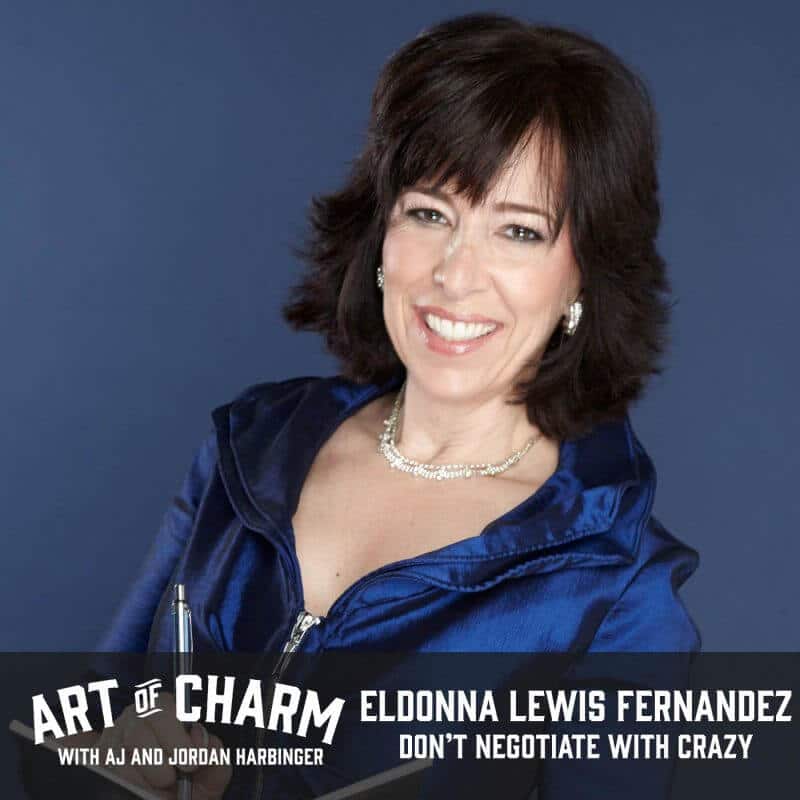Think like a negotiator in all aspects of life and create win-win results by understanding the pitfalls to avoid.
“That’s all negotiation is — basically a technical term for discussions and conversations to reach an agreement.” -Eldonna Lewis Fernandez
The Cheat Sheet:
- Silence is a powerful weapon in negotiation.
- A negotiation is an agreement.
- Are the principles of persuasion the same across geography and culture?
- Go to garage sales to practice negotiation with almost no risk.
- How can mock negotiations help you practice before the real deal?
- And so much more…
[aoc-subscribe]
Eldonna Lewis Fernandez is a retired Air Force veteran with 23 years of service as a contracts specialist under her belt, and seven years of experience working for defense contractors (on the other side of the table!) in the aerospace industry. She is the CEO of training and consulting firm Dynamic Vision International, Inc.; over 30 years, she’s learned a lot about leadership, contract management, and negotiation experience.
In episode 435 of The Art of Charm, Eldonna shares some of her wisdom about negotiation, relationship building and confidence in the context of negotiation, how to use leverage to your advantage, questions to test the other side to make sure you can get that leverage in the first place, and of course what to do when you run into certain pitfalls of negotiation so you can get the best win for yourself.
More About This Show
When you think about negotiation, you may have in mind a table — no doubt carved from unsustainable, rainforest-felled hardwood — surrounded by bullies in business suits manipulating each other into unfair situations to get the upper hand in whatever shady deals they’re trying to make. This pervasive stereotype leaves too many with the impression that negotiation is something disingenuous people do, but the reality is: negotiation is for everybody.
“We negotiate every day of our lives,” Eldonna Lewis Fernandez tells us, “whether it’s a multi-million dollar deal, how to get your kids to do their homework, or where to meet for dinner — it’s all negotiation.”
Once you can look past the stigma of negotiation, you’ll see it as a skillset that — properly mastered and used responsibly — can be of powerful benefit to the people on both sides of a deal. Eldonna sees practical use of what she teaches as the most fulfilling part of her chosen career. “Even if I’m just doing an hour talk and I see somebody grasp the concept,” she says, “and then they go out and they get a better deal for themselves and I hear about it, that’s what’s rewarding for me.”
And while Eldonna can tell you that negotiation tactics — at their core — tend to be similar whether dealing with civilians, military personnel, or people from all parts of the world, there are some differences that should be noted. One case in point: after 9/11, she was sent to the Middle East for four months to negotiate with locals for military base supplies. There, negotiation is seen as an art form; far from stigmatized, it’s a part of the culture. And someone from the western world who doesn’t understand the basics of this art form will find themselves, at best, unprepared — at worst, at risk of being outright offensive. “It’s more about relationship building. If you walked in and said, ‘Hey, I want to buy this, this, and this; give it to me and let me go,’ they’d get highly offended. They want you to sit down, have some tea, have something to eat; that’s all part of how they do business.”
One mistake people in the United States commonly make when negotiating is not building relationships first. As Eldonna points out from her experience in the Middle East, it’s not about the quantity of the context; it’s about the quality. People who are like each other like each other, and if you can really connect and find out what you have in common with someone you’re negotiating with, it’ll build trust faster. It works the same way in the Western world as it does in the Middle East, but people from the latter are more likely to acknowledge this fact because it doesn’t have a negative association attached to it. Put it this way: are you more likely to do a favor for someone you trust and consider friendly over someone you don’t care for or don’t know? Of course. Negotiation runs on the same principle.
As Eldonna illustrates,”We’re in this microwave society in the U.S. where we want to get [everything] done in a hurry.” We look at technology and how fast things are moving and we want our business to move that fast, too. But if you take the time to build relationships, you’ll be the one that comes to mind when someone’s looking for the goods or services you provide.
The number one thing you need to begin building these relationships and learning the ropes of negotiation is confidence, and this is probably what scares away most people who self-diagnose themselves as being “bad” negotiators. The only way to get better is to just go out and do it, and one of the best — and low-risk — ways to get practice is by hitting the yard sales and swap meets that go on in your neighborhood every weekend.
“You can’t flip a light switch and be a great negotiator,” says Eldonna, “you have to actually do it to get good at it.”
As you roll up your sleeves and start practicing in earnest, you’ll pick up on specific body language and non-verbal communication that results from offers — both good and bad — that you pitch to others. It’ll also make you more conscious of how you carry yourself under the same circumstances. “If it’s not a good deal and you feel uncomfortable with it,” Eldonna says, “you don’t want to show that, because if somebody else is good at reading body language, they’ll pick it up!”
Aside from the low-stakes, real-world experience of negotiating at yard sales, Eldonna also recommends preparing for job interviews, salary reviews, and other potentially stressful negotiations by playing out mock scenarios with a partner beforehand. It’ll give you a chance to work out some of the kinks in your presentation and elevate your confidence before walking into the real deal.
In Eldonna’s book, Think Like a Negotiator, she lays out 50 ways to create win-win results from negotiation by understanding the pitfalls to avoid. One of the biggest pitfalls she identifies is lack of preparation. When she’s asking questions the other party can’t answer — because it’s apparent they haven’t adequately prepared — she can usually use this as leverage to her advantage.
“Are we going to have to come back and have another discussion,” Eldonna might ask firmly, “or are we going to be able to answer these questions now?” Nobody likes to have their time wasted — or be seen as a time-waster — so someone on the unprepared side of a negotiation may be more inclined to make a deal on the other party’s terms.
Being willing to just walk away from a negotiation that doesn’t meet a pre-defined set of requirements demonstrates strength that ties in with why it’s important to be prepared. “You have to go in and know what your walk-away point is,” says Eldonna. “If we get to this point…I’m done. I know in advance I’m willing to walk away at this point…I’ve got that agreement with myself so I don’t get caught up in the emotion of the moment and agree to something that isn’t a good deal.”
Listen to this episode in its entirety to find out how to avoid being softballed by your mock negotiation partner, ways to build connections and break barriers with people before you negotiate with them, how much research before a job interview is appropriate (and what might be overkill), more questions to ask, more pitfalls to avoid, the power of silence, how Eldonna was received as a woman negotiating in cultures that aren’t traditionally open to the idea, and tons more!
THANKS, ELDONNA LEWIS FERNANDEZ!
Resources from this episode:
Eldonna’s website: Think Like a Negotiator
Think Like a Negotiator by Eldonna Lewis Fernandez (Book)
The Art of Charm bootcamps
You’ll also like:
-The Art of Charm Toolbox
-Best of The Art of Charm Podcast
On your phone? Click here to write us a well-deserved iTunes review and help us outrank the riffraff!




